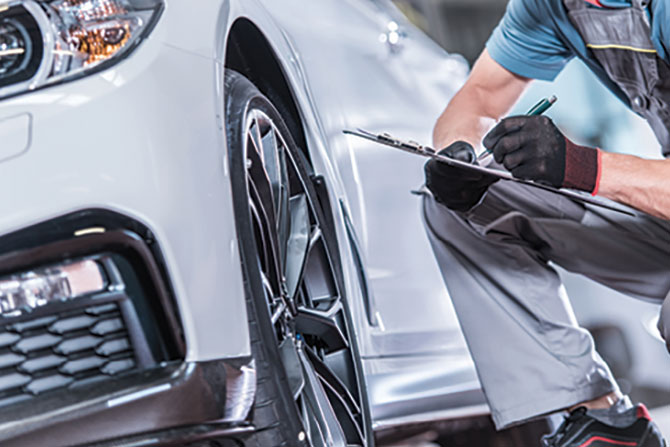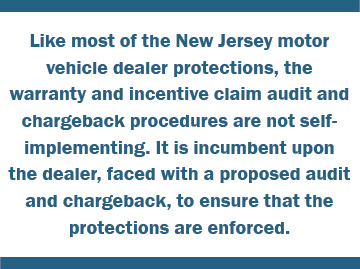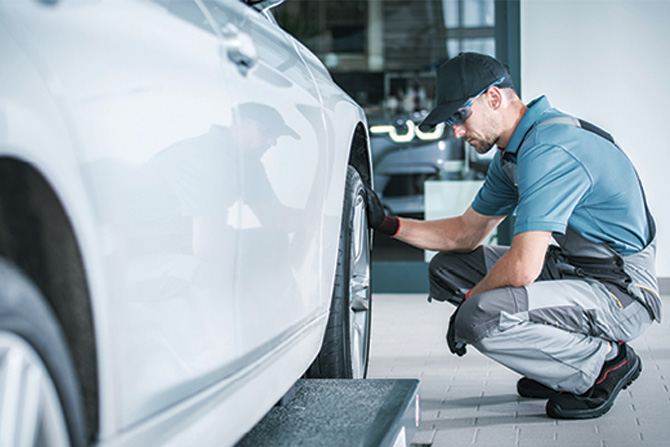By Richard Sox, Esq.
Dealers Should Know Their Rights Under the New Jersey Franchise Practices Act
During the early months of the COVID-19 pandemic, motor vehicle manufacturers all but ceased conducting regularly scheduled dealership sales incentive and warranty audits. Almost a year into the pandemic, manufacturers have started scheduling new audits, and some are rumored to have a plan to audit every dealer in the United States. We have heard from several Nissan dealers who have already been audited and are in the process of receiving the results of those audits, including claim chargebacks. With this backdrop, New Jersey dealers should remember that they have very strong franchise protections when it comes to a manufacturer audit and any resulting proposed chargebacks.
First, a manufacturer may not audit warranty or incentive claims beyond 12 months from the date the claim is paid. Most manufacturers are aware of the “look-back period” for audits in each state. It is prudent to ensure that the auditor is asking to review only claims within this 12-month statutory period. The only exception to the 12-month look-back period is if the manufacturer can show that it reasonably expects fraud in the dealership’s claims submission process. In that rare case, the manufacturer can review claims which have passed the 12-month mark.
With regard to warranty claims, a manufacturer can only propose to chargeback claims for the following reasons:
- the claim was false or fraudulent;
- the services were not properly performed;
- the parts or services were unnecessary to correct the defective condition; or
- the claim was not reasonably substantiated per the manufacturer’s reasonable written requirements.
Similarly, a manufacturer can only propose to chargeback an incentive claim for the following reasons:
- the claim was false or fraudulent; or
- the claim was not reasonably substantiated per the manufacturer’s reasonable written requirements.

Breaking down each of these permissible reasons for a chargeback, dealers will see that they have a strong argument for rejecting most of the manufacturers’ proposed warranty and incentive claim chargebacks.
First, the “false” or “fraudulent” claim may be the most difficult burden for the manufacturers to meet. The definition of “false” is fairly straightforward. In the case of a warranty claim, a false claim would involve a claim for a repair that was not performed as claimed. For an incentive claim, a false claim would involve a claim for an incentive for which the customer or dealership was not eligible. A “fraudulent” claim would be similar but involves the added element of intent. For a claim to be fraudulent, the dealership would have to have intentionally submitted materially false information.
Second, for a claim to be charged back because the warranty service was not properly performed also creates a very high burden on the manufacturer. This basis for a chargeback focuses, not on the claim submission, but whether the service department properly performed the repair. Like allegations of fraud, chargebacks based upon an allegation that a repair was not performed according to the manufacturer’s instructions are rare.
The third basis upon which a manufacturer is permitted to chargeback payment on a warranty claim falls more in line with the first basis (i.e., a “fraudulent” claim). This involves a part or service not necessary to correct the defective condition. In the day and age of electronic vehicle diagnostics and troubleshooting directed by the manufacturer’s internal master mechanics, it would be a very unusual situation for a dealership to utilize a part or service which was not authorized to repair the warrantable item on the vehicle. In most cases, the only reason an unnecessary part or service would be used in a warranty repair would be to intentionally submit a false claim.
The last reason a manufacturer can seek a chargeback for payment made on a warranty or incentive claim is that the claim was not substantiated, according to the manufacturer’s reasonable written requirements. This is the most commonly used (and disputed) basis for a proposed chargeback by the manufacturers. In challenging a chargeback on this basis, the New Jersey dealer needs to break this statutory provision down into two parts. First, was the claim reasonably substantiated in accordance with the manufacturer’s written claims submission requirements? And, second, are the manufacturer’s written claims submission requirements “reasonable”?
Regarding the first part of this reason, the New Jersey Legislature clearly intended to prohibit a chargeback where a sufficient amount of information on the warranty repair or incentive was provided to the manufacturer. Not completing every small detail in the written claims submission process, including administrative errors and oversights in those submissions, will not suffice to allow the manufacturer to chargeback payment on a warranty or incentive claim.
Regarding the second part of this reason, any allegation that the dealership failed to follow the manufacturer’s written warranty or incentive requirements must first pass the test of being “reasonable.” In the case of a warranty claim, the question will come down to whether the requirement is necessary for the manufacturer to substantiate that the repair was a warrantable item and that the proper work was completed to make the repair. For an incentive claim, the question will come down to whether the requirement is necessary for the manufacturer to substantiate that the customer or dealer was eligible for the incentive at issue. Many of the manufacturer’s written warranty claim procedures go far beyond what is reasonable.

Like most of the New Jersey motor vehicle dealer protections, the warranty and incentive claim audit and chargeback procedures are not self-implementing. It is incumbent upon the dealer, faced with a proposed audit and chargeback, to ensure that the above protections are enforced. In many cases, challenges to a proposed audit chargeback are amicably resolved through the manufacturer’s internal dispute resolution process or voluntary mediation. Failing resolution using this process, dealers have a right to formally challenge the chargeback in Superior Court. They will be entitled to seek an injunction to stop the chargeback and be paid their attorney’s fees and costs by the manufacturer when successful in alleging a violation of New Jersey law.
Richard Sox is the managing shareholder of Bass Sox Mercer law firm, which represents NJ CAR and New Jersey dealers in motor vehicle franchise-related matters. Bass Sox Mercer is a national firm specializing in dealer disputes with their manufacturer, purchasing and selling motor vehicle franchises and regulatory matters. He can be reached at rsox@dealerlawyer.com.
This story appears in Issue 4 2020-21 of the New Jersey Auto Retailer Magazine.







